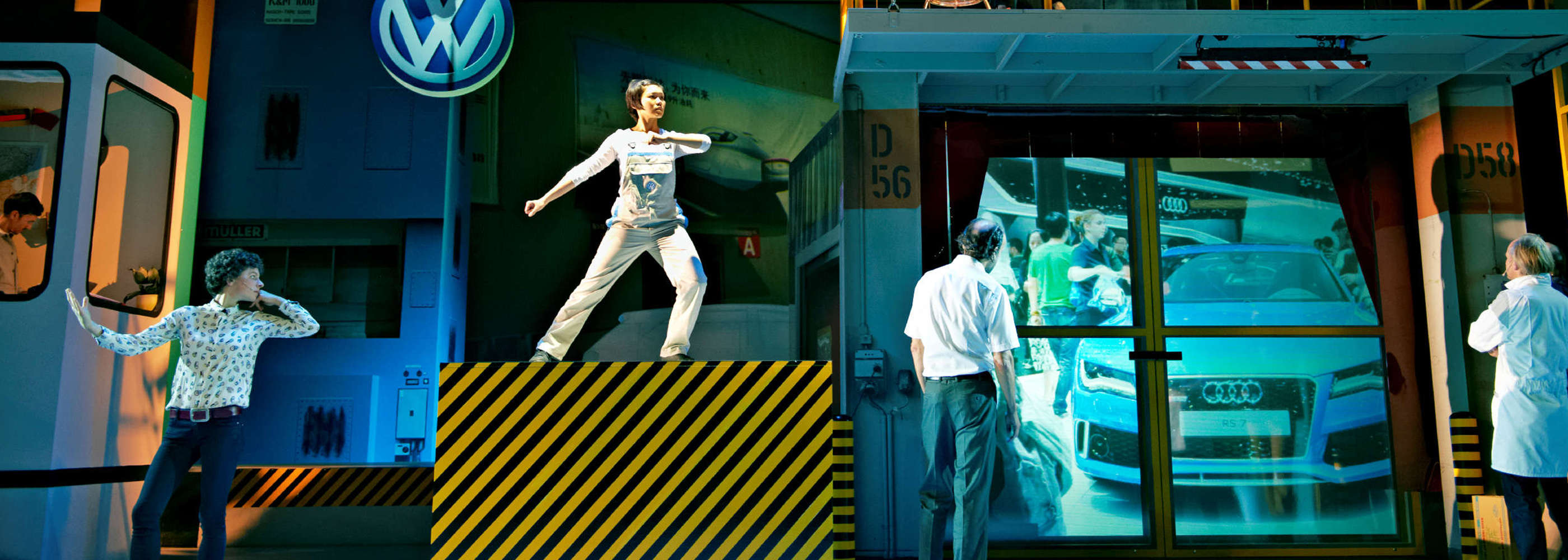

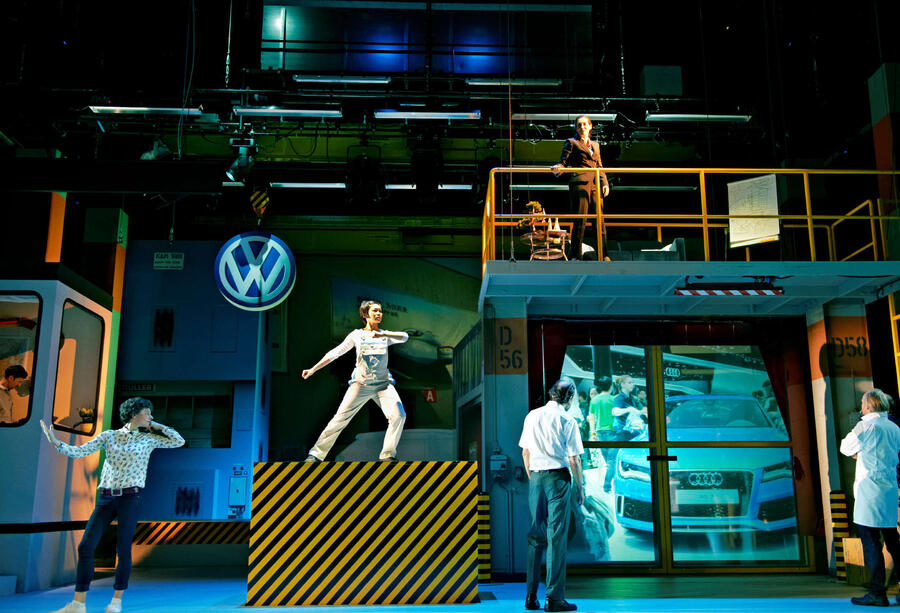
Xinjiang, Volkswagen, Karaoke, the Red Women's Battalion, copy, little swallow, the Art of War, the shareholders' meeting, the National Congress... What do these disparate words have in common? We see a grand stage resembling a workshop. Four German Volkswagen expats and the German wife of an expat, portrayed by actors, share their everyday experiences in China with their fellow countrymen through emails. Among them is a Chinese worker, embodied by a dancer who moves wordlessly across the entire stage, dancing and finally gazing silently at the audience. A musician producing live ambient sounds is seen as a porter in a small cabin and later surprises as a singer. Even more surprising is the choral appearance of eleven German schoolchildren: They recite the history of VW, learn Chinese, perform acrobatics, and imitate revolutionary dance movements from Chinese television images. In addition, impressively simulated machines move up and down. On an LED display – an essential part of the workshop – German and Chinese texts run. Video sequences are projected on two surfaces, primarily recorded by director Stefan Kaegi during his research trip through China. The text and video material is based on numerous encounters and conversations in China and Germany, which the documentary theater piece "People's Republic of Volkswagen" intricately wove into a polyphony using complex theatrical means in October 2014 at the Schauspielhaus Hannover.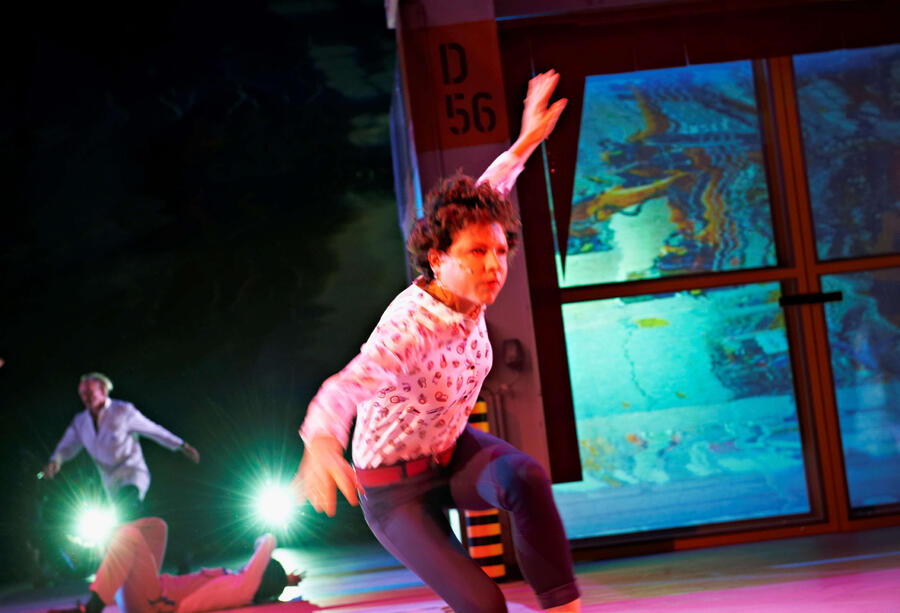
When director Stefan Kaegi (Rimini Protokoll) told me about the project during the preparation phase, it immediately piqued my curiosity. VW and the subject of automobiles are connected to my life in a certain way. When I completed my German studies in Shanghai, the VW joint venture there was in full swing. We graduates were in high demand as future interpreters. Over the following decades, I witnessed how the (German) automotive industry rapidly expanded throughout China, how we sat in traffic jams for hours in Beijing due to the ever-increasing number of cars, how a friend eagerly waited for months for a VW SUV due to the many buyers on the waiting list, how our skies were increasingly plagued by smog, and how one couldn't step outside without wearing respiratory masks. VW serves as a fantastic lens for reflecting on the facets of a complex reality. Naturally, I agreed to Kaegi's request and joined the project as co-dramaturge.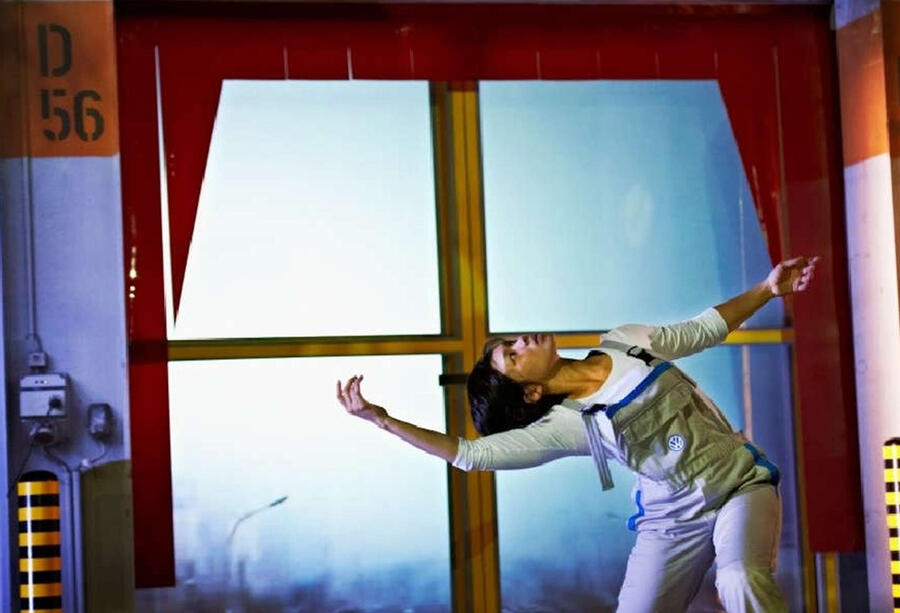
My first task was to connect the director with high-ranking representatives from the legal and business sectors within my network for his second research trip to China. Two of my acquaintances ultimately canceled the meeting after much deliberation because they found the topics to be too unpredictable – especially with a foreigner they didn't know. It was simply too much of a risk for them! I was disappointed but could understand their stance. Once again, it became clear to me how cautious we are when it comes to openly engaging with unfamiliar people. In the protected sphere of private circles, we speak openly. However, as soon as we step outside our familiar circle, we show a different face. I don't know if I would have acted differently in my acquaintances' shoes.
Nevertheless, Kaegi returned from his trip with a wealth of material. I began to immerse myself in it, just before rehearsals started. On the large rehearsal stage in Hannover, I met a diverse team from various nations, spanning from Asia to Europe and South America. If I include the children, there were almost thirty people. I would like to experience such a scenario in China one day! On a long table, there were books and documents related to the project so that each participant could read into it. Rehearsals took place on different levels. VW employees came to us, and we asked them many questions; the director conducted a Skype conversation with a human rights activist in which we participated; we visited the VW workshop, watched video films from China. The Japanese choreographer, Miki Shoji, trained intensively with the actors and worked on choreography with the dancer. The musician experimented with newly composed sounds, and I joyfully taught the children Chinese nursery rhymes. Throughout the rehearsals, Stefan Kaegi, in collaboration with the dramaturges, repeatedly refined, added, and rearranged the text. He continued to fine-tune it until shortly before the premiere. Accordingly, the video material closely related to the text was adjusted by the video artist. If the premiere hadn't been approaching, it could have been an endless process.
The essential part of the rehearsals was working with the actors. Unlike Rimini Protokoll's projects, this time the expats were portrayed by actors. A rehearsal stage was set up, providing a sense of the final stage design, and all the technical facilities were readily available on-site. The actors practiced and rehearsed dance movements, including Tai Ji and Gong Fu. They attempted to sing Chinese karaoke, which was a lot of fun for everyone. They learned to pronounce Chinese names with me, which was not an easy task, requiring patience from both sides. I always marveled at how quickly the German actors learned the text and character. In the evening, they played a different character in the repertoire, so they had to constantly switch between identities. The actors made a significant effort to approach the new identity, trying out different acting styles to bring each scene to life.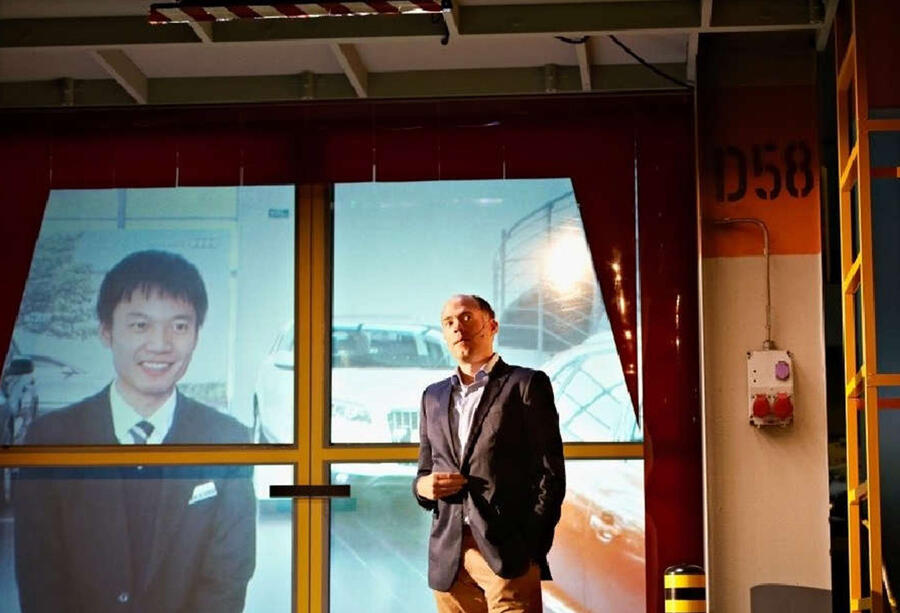
Two weeks before the premiere, we moved to the main stage of the theater. It was exciting to observe how the documentary nature of the original material unfolded its artistic impact on the grand stage, opening up a space that extended far beyond personal narratives. At the same time, I noticed that some of the intimacy that had prevailed on the rehearsal stage was lost here. Especially when the actors faced the audience directly and tended towards exaggerated, theatrical gestures, a style reminiscent of grand "mime theater." I couldn't help but think the (unnecessary) question: What did he or she play last night? I felt most engaged when an actor narrated unpretentiously, close to the audience, close to life, and undramatic.
In the final phase of rehearsals, I recorded myself as an engineer on Skype video. These video clips became part of the performance and enriched it with the perspective of a Chinese engineer working in the German VW factory. What I initially considered somewhat trivial greatly amused the German audience. The shift in perception led to humor because it questioned the obvious, for example, when the Chinese engineer in the video said, "In Hannover, you mostly see small houses, everything is quiet, hardly any traffic jams, and very good air. It's like a small town. Only half a million inhabitants!" The German audience found this very funny. I would love to experience the performance in China and see how the audience there reacts to the expats. What made the rehearsal process exciting was the complexity and openness with which diverse people, along with the stage machinery and different voices, came together with the laughter of the audience to create a unique polyphony.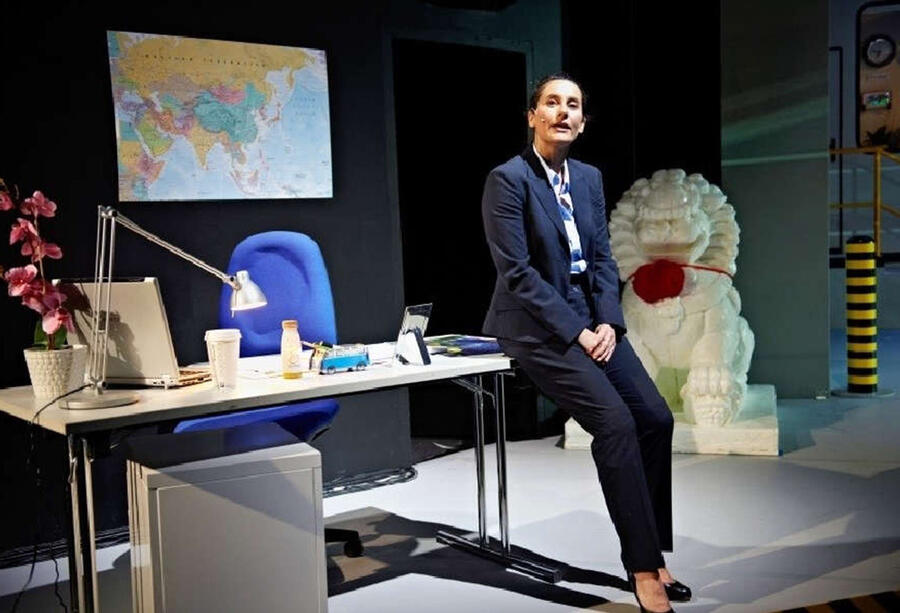
In December 2014, I read the following report in a German newspaper: "Almost 40 percent of all cars from the group's brands VW, Audi, Škoda, Seat, Porsche, Bugatti, Bentley, and Lamborghini are now sold in China... Volkswagen is expected to earn around 60 percent of the group's net profit in China this year." When Volkswagen merges with the People's Republic, when economic power goes hand in hand with political power, when capital becomes the newly invented god, what does it all mean for the "people"? Who are the people? How can the individual respond to this reality? What kind of world will we leave for future generations? The performance "Volksrepublik Volkswagen" raised many pressing questions.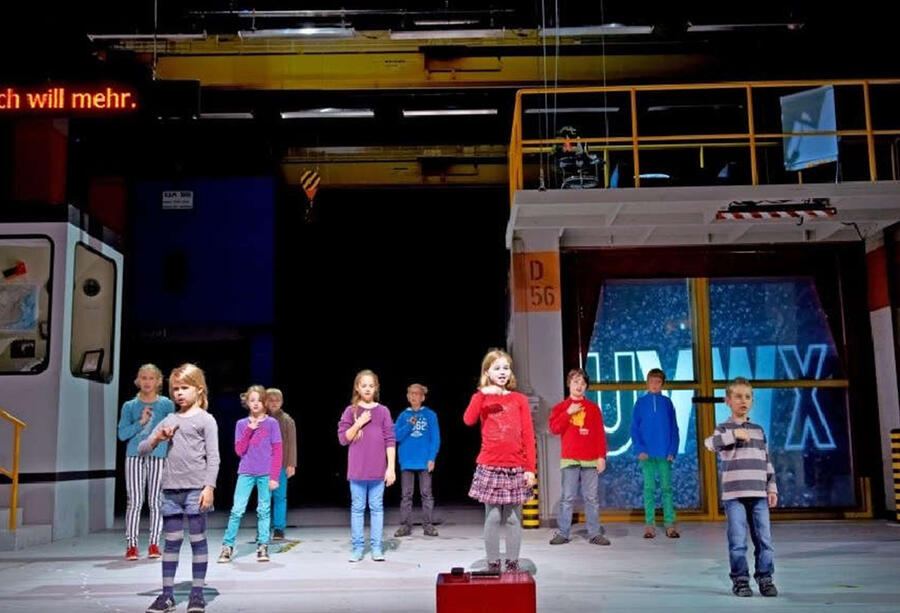
Even my perception has shifted. When I was in Beijing in early 2015, I stood on the street and watched the cars speed past me. This time, it seemed like there were even more large and expensive jeeps and SUVs than six months before. One image was constantly present in my mind: children wearing respirator masks, working like electronically controlled robots in a huge empty factory—fast, faster... The world with wider streets and taller skyscrapers all around seemed much more unreal to me than that image. The image is the final scene of the performance. It haunted me.
(This text was published in the magazine "Theater der Zeit" and in the book "Zeitgenössisches Theater in China" by Alexander Verlag.)
Photos: Katrin Ribbe